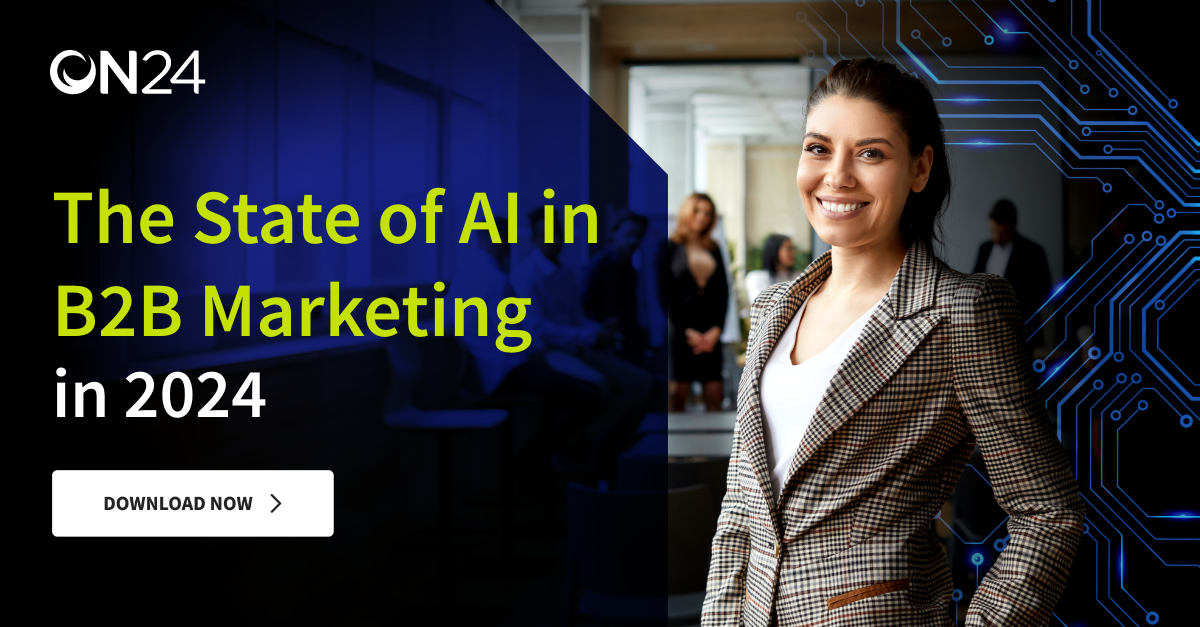B2Bマーケターは変化に慣れており、特に新しい技術が導入されるとそうです。しかし、その中の一つの新興技術である生成AIは、他のトレンドとは少し異なります。B2Bマーケティングを新しく刺激的な時代へと押し進め、チームがついに大規模に体験をパーソナライズできる時代へと導いています。
では、B2Bマーケターはこの変化にどのように対応しているのでしょうか?その答えを知るために、ON24は全米の500人以上のB2Bマーケターにアンケートを行い、チームがどのようにAIツールを活用しているか、またマーケターが将来AIが業界にどのような影響を与えると考えているかを理解しました。
これらの調査結果は、私たちの特別報告書にまとめられています。 2024年のB2BマーケティングにおけるAIの現状.ここで知っておくべき重要な発見を紹介します。
B2Bマーケター向けのトップAIトレンド

私たちの2024年のB2BマーケターAIリサーチレポートは以下の通りです。
-
- 85%の組織が、AIを活用しない企業よりも収益パフォーマンスが向上すると同意しています
- 83%の企業がAIによってマーケターがスケールアップし、パーソナライズを改善できると考えています
- 87%の企業がAIがマーケティング自動化をより効率的かつ効果的にしていると同意しています
- 84%の企業が、AIの賢い活用が購入者体験を向上させると同意しています
B2BのAIツールの継続的な採用に関して、私たちは以下の点も発見しました:
-
- 84%の企業がマーケティング戦略により多くのAIを取り入れる計画を立てています
- 経営者の72%が従業員にAIをどのように活用するか尋ねています
調査によると、AIはB2Bマーケターの支配を確立しています。実際、回答したB2Bマーケターの87%がAIを使用またはテストしていると答えています。半数以上(53%)がAIを大きく活用していると報告し、34%が現在AIのテストや活用のためのロードマップ作成中です。
さらに、8割以上(84%)のB2Bマーケティングチームが2024年末までにAIを戦略に統合する計画を立てています。これは、分析や測定(93%)、プロモーションコンテンツ開発(87%)、オーディエンスセグメンテーション(85%)、ウェビナーやイベント(80%)などの分野でAIが与える潜在的な影響についてマーケターが強い感情を持っているためと考えられます。
多くのB2Bマーケターは現在、コンテンツ制作などの分野でAIを活用しています。約3分の2(63%)が、ランディングページやメールコピーなどのプロモーションコンテンツ作成にAIを活用しており、これは調査回答者の間で最も多く引用されるAIのユースケースです。
これは、コンテンツ制作に時間がかかることがあり、より多くのコンテンツの必要性が増していることを考えると理にかなっています。適切なAIツールがあれば生成AIは、コピーライターが完成させるための初稿を整理・アウトライン作成・作成することで、コンテンツ制作を加速させることができます。
AIを使用している回答者のほぼ半数(45%)がウェビナーやバーチャルイベントにもAIを利用しています。AIを使えば、チームは ウェビナーとバーチャルイベントの最適化 プロモーションのパーソナライズ、オーディエンスエンゲージメントの最適化、コンテンツ推薦の自動化などです。実際、AIの能力は ウェビナーの内容を再利用 ウェビナーの公開日をはるかに超えて寿命を延ばすのに役立ちます。
今日のマーケティングにおけるAIの活用

多くの話題があります B2BマーケティングにおけるAI活用しかし、話すことが必ずしも行動を意味するわけではない。私たちは、どれだけ多くのマーケターがAIを使っているか、あるいは使う予定があるのか知りたかったのですが、そこで得た結果を紹介します。
AIに関する話題は広まっています。調査回答者の53%がすでにAIをかなり活用していると答え、33%が現在AIのテストと実装ロードマップを作成中です。さらに10%は現在AIを使っていませんが、将来的に使う予定だと答えました。
回答者のわずか4%が、B2BマーケティングでAIを活用する予定がないと答えています。これは、AIが競争の激しいB2B環境に浸透し、あらゆる企業がイノベーションと効率性の機会を認識していることを示しています。
業界別のマーケティングにおけるAIの利用状況

また、異なる業界でのAI利用も調査し、AIのB2Bマーケティングが最も広まっている場所をよりよく理解しました。調査した産業の中で、 金融サービス トップで、回答者の67%が利用していると答え、90%が来年統合を計画しています。
テクノロジー分野の回答者の53%がAIを利用しており、86%が来年AI使用を計画、36%が現在テストやロードマップ作成中です。
50パーセント 製造 そして 職業としての経歴 回答者はAIを利用しており、80%が来年統合を計画しています。
の 生命科学製薬業界、医療業界では、B2Bマーケターの44%がAIを利用しています。38%がAIのテストやロードマップ作成に取り組み、86%が2025年にAIの統合を計画しています。
この遅いが着実なアプローチは、医療関連産業全体で規制が強化されているためかもしれません。しかし興味深いことに、金融サービス企業も同様の規制に直面している一方で、AI統合のペースは私たちが調査した他のどの業界よりも速いです。
収益規模によるマーケティングにおけるAIの利用

調査データから得られた最も重要な洞察の一つは、あらゆる規模の企業がB2Bの営業やマーケティングにAIを導入していることです。現在、収益が2500万ドルから1億ドルの企業がリードしており、61%がすでにAIを活用し、91%が来年統合を計画しています。
現在、売上高が2500万ドル未満の企業の50%がAIを利用しており、81%が来年も利用を計画しています。売上高1億ドルを超える企業の84%が来年導入を計画しており、48%はすでに利用しています。
AIのテストやロードマップ作成に取り組んでいる企業を見ると、全体的に似たような状況です。収益が2500万ドル未満の企業の35%が現在テスト中、2500万ドルから1億ドルの売上を持つ企業の32%、売上高1億+ドルの企業の33%がテスト中です。
AIを使うB2Bマーケターはターゲットを上回る確率が7倍高い

多くのB2BマーケターがAIを積極的に取り入れている一方で、本当に驚くべきはAIの導入と組織の成功達成との相関関係です。現在AIを活用しているマーケターの中で、驚くべきことに64%が組織の目標を超え、達成できなかったのはわずか9%です。対照的に、まだAIを採用していないマーケターの29%が目標達成に失敗したと報告しています。
マーケティングにおけるAIの迅速な導入をさらに支持する2023年の研究は、AIがビジネス慣行に迅速に統合されていることを強調しています。マッキンゼーのデータによると、 人工知能指数レポート スタンフォード大学によると、マーケティングおよび営業部門は昨年、他の部門と比べて最も高いAI導入率を記録しました。この導入は事業のパフォーマンスに大きな影響を与え、65%の回答者が収益の増加、41%がコスト削減を報告しています。
AIがB2Bコンテンツマーケティング活動をどのように拡大するか

どのB2Bコンテンツマーケターも、新鮮で関連性の高いコンテンツの需要は尽きることがないと言うでしょう。そのため、マーケターはすでにAI技術を活用し、コンテンツ再利用などの手法を通じてコンテンツを生成しています。
プロモーションコンテンツの開発は、現在AIを使用している回答者の中で最も多く引用されたマーケティングユースケースでした。AIを使ってコンテンツを作成することは、ランディングページやメールコピーだけにとどまりません。調査回答者の約半数(49%)が、電子書籍やブログなどのコンテンツ開発にAIを使用しています。
生成AI テクノロジーはB2Bマーケターの業務効率も向上させます。これにより、マーケターは時間やリソースの制約でこれまで達成できなかった戦略や戦術を探求し、実行する時間が増えます。使いやすいAIソリューションにより、B2Bコンテンツクリエイターはプロセス内で迅速にイノベーションを起こし、大規模なトレーニングや複雑なセットアップを必要とせずに迅速な投資収益を得ることができます。
AIがウェビナーからより多くの価値を得るために不可欠であること

AIは、B2Bマーケターがウェビナー、バーチャルカンファレンス、デジタルイベントからさらに多くの価値を引き出すユニークな機会を提供します。 平均して、ウェビナー参加者は1セッションで53分間視聴します。それは約10,000語の話し言葉に相当します。
それがマーケターが活用できるコンテンツです 他のフォーマットへの再利用 生成AIの助けを借りて。AIが実際に活用されたとき、ひとつの思考リーダーシップウェビナーがどんなものになるかを見てみてください。
-
- ウェビナーの書き起こしからの講演者の引用を用いたソーシャル投稿
- AIが重要な発見やハイライトを活用して作成したブログや電子書籍
- AI搭載の分析によって特定されたオーディエンスエンゲージメントの重要な瞬間を短くまとめた短い動画クリップ
今日のマーケティングで使われているAIと、来年使われるものの違い

企業がB2BマーケティングにAIツールを活用する方法はさまざまです。AIはデータ自動化に至るまで、あらゆる分野で効率を高めます。 コンテンツ制作 そして、さまざまな分野でマーケティング活動を拡大するために活用できます。
これほど多くの応用が可能な中、マーケターがどこでAIの利用を優先しているのか知りたいと思いました。私たちはアンケート回答者に、現在どのマーケティング活動にAIを使っており、2025年に向けてどの活動に注力するかを尋ねました。
生成AIの影響は結果に明確に表れています。現在AIの最も人気のある用途はプロモーションコンテンツ開発(63%)で、AIはランディングページやメールコピーなどの素材向けにパーソナライズされたテキストを生成します。さらに49%の回答者がAIを使って電子書籍、ブログ、その他の情報コンテンツを作成しています。
AIのもう一つの人気の利用例は分析と測定(59%)です。AIツールは膨大なデータを迅速に処理・理解し、人間が見つけにくいパターンや傾向を特定できます。貴重なインサイトが手に入るため、マーケターがデータ分析の改善のためにAIに注目するのは驚くことではありません。
AIはデータを解釈し将来のパターンを予測する能力を持つため、オーディエンスのセグメンテーションにおいても非常に貴重な役割を果たしています。回答者の47%が現在この目的で利用しており、46%は来年も利用する予定です。
調査の45%のB2BマーケターがウェビナーやバーチャルイベントでAIを利用しています。例えば ON24インテリジェントエンゲージメントプラットフォーム これにより、バーチャルイベントの前後でリードを育み、収益を伸ばすためのオーディエンスエンゲージメントを最適化できます。この傾向は今後も続き、46%が今後のウェビナーやバーチャルイベントを優先しています AIマーケティング 戦略。
マーケターが今年または来年にAIを優先する主な活動は、分析と測定(62%)、プロモーションコンテンツ開発(60%)、非プロモーションコンテンツ開発(51%)です。
日常生活におけるAIの利用

私たちは、仕事内外の日常生活でAIの利用がどれほど広範囲にあるかを知りたかったのです。私たちの調査では、マーケターにAIをどの分野で活用しているか尋ねたところ、興味深い結果が得られました。
主な教訓は、ほとんどの人が何らかの形でAIを使っているということです。回答者の26%は仕事中のみ、5%は仕事中以外のみ、64%は仕事中・勤務外の両方で使用しています。全く使っていないと答えたのはわずか5%でした。
回答者は、仕事だけでAIを使う人が多いのに対し、個人的な生活だけでは使わない人数の5倍以上です。これは、AIがワークフローの効率化、生産性向上、パフォーマンス向上に与える利点をますます認識していることを示しています。
今と将来でAIに投資すべき主な理由

マーケターは作業量や効率性に苦労しますが、それだけがAIを使う理由ではありません。この技術の多様性は多くの潜在的な利点を意味しているため、私たちは調査回答者に投資の最大の理由は何かを尋ねました。
「効率」が最大の理由(16%)と評価されましたが、結果に大きな統計的ばらつきは見られませんでした。「より良いデータ」と「洞察」が次いで、15%がこれを最優先理由とし、「時間の節約」と「ROIの向上」がそれぞれ13%と12%の票を獲得しました。
11%の人がより良いビジネス成果をAIへの投資の第一の理由と考え、10%がより良い顧客エンゲージメントと体験を主な理由としています。回答者の回答がこれほど分かれていたという事実は、AIが企業にとっていかに広範な利益であるかを示しています。
また、回答者にはAIへの投資の今後の理由についても尋ねました。半数以上(54%)が、より良いデータと洞察、効率性(52%)、時間の節約(50%)が主な理由だと考えています。
48%がROIの向上が投資の理由になると考え、42%がイノベーションも重要だと考えています。多くのマーケターがAIが将来的に自分たちの仕事に役立つことを期待している中、今投資している企業は競争優位性を得ることができます。
AIがあなたの生産性を向上させると思いますか?

最後に、私たちは AIが生産性に与える影響 B2Bマーケティングにおいて。多くのマーケターはAIが生産性を向上させる可能性が高いと考えており、54%が確実に、37%がおそらくそうなると答えています。
B2Bマーケターのうち、AI導入後に生産性が変わらないと予想しているのはわずか7%です。
AIは、ルーチン業務の自動化、迅速なデータ分析、新規コンテンツ生成、リードの優先順位付けのための予測分析の実施により、B2Bマーケティングや営業生産性を大幅に向上させることができます。
あなたのようなマーケターがどのようにAIを活用しているかを学びましょう
B2B企業はAIを活用しているだけでなく、将来的にはその利用拡大にも意欲的です。また、マーケターがウェビナーからより多くの価値を引き出したい場合、AIの活用の重要性も浮き彫りにしています。
詳細は今すぐレポートをダウンロードしてください。




